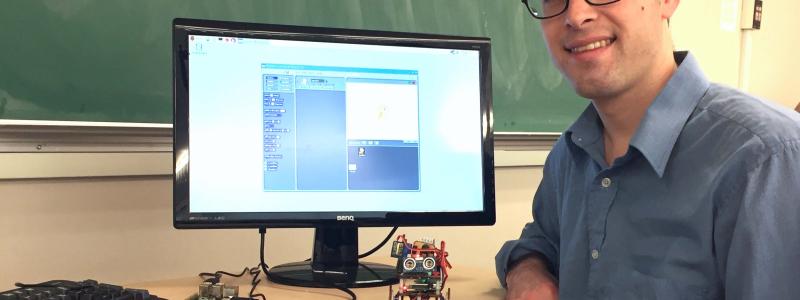It’s never too early to get children into Raspberry Pi, a credit-sized computer that even novices can program—especially if it will help children learn about robotics.
That’s the viewpoint of Sam Pimentel, a Trinity Western University mathematics professor. This spring, Pimentel will offer the new Pi in the Valley workshop to Fraser Valley middle school kids.
“I want to plant the seed for the birth of our next generation of technology innovators,” says an excited Pimentel.
During the workshop, students will get to explore how a Raspberry Pi is created and used. They will then learn to write their own computer programs. Finally, they will use the Raspberry Pi and their newly-acquired programming skills to direct a child-friendly and fun robot called Tiddly-Bot to do simple tasks such as draw lines with a pen or follow them.
Pi in the Valley is the newest addition to TWU’s Science in the Valley workshop series, which typically runs May 1-30. Pimentel first envisioned Pi in the Valley in 2012, when Raspberry Pi was invented.
The Science in the Valley workshops, which cover biology, chemistry and environmental studies, try to cultivate elementary-school-aged kids’ appreciation of science at an age when it’s usually starting to wane. The professors who develop the workshops hire TWU students as teaching assistants to engage their protégés in hands-on experiments.
“We’ll get the students to use Scratch, a programming language and interface developed by MIT to make coding accessible to young children,” explains Pimentel. “It basically has ready-made blocks of code that can be dragged and dropped into place like pieces of a puzzle.”
Pimentel and his wife, Ann, an elementary school teacher, have already been able to test run aspects of his workshop in local schools.
At TWU, Pimentel works as a researcher who uses applied mathematics to better understand glaciers, ice sheets and oceans.
“I use computers and computer programming in my research and I would like to inspire others to pursue science, technology, engineering and math subjects,” he says. “There is the potential to use the Raspberry Pi and robots in research applications.”
To date, the Pi in the Valley workshop’s inaugural offering has attracted about 810 students or about 27 classes at a cost of $12 per student or $250 a class. The Science in the Valley series has drawn almost 19,300 young minds into its labs and field trips since its inception 11 years ago.

